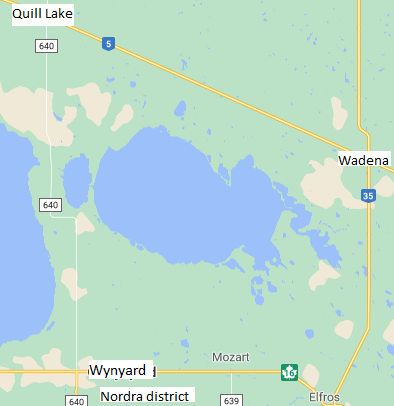 Halldóra Guðjónsdóttir emigrated west in 1890 with her husband, Jóhann Óli Björnsson. Her brother, Ásgeir, had emigrated in 1883 and had settled in the Lakes Settlement in 1907, same year Halldóra and Jóhann moved there from Winnipegosis. She mentions him in her account below, which she wrote in 1955, three years before her death:,, I came to what is now Nordra District on June 1, 1907, with my husband, J. Oli Bjornson, and our four children, Edward, Sigga, Kristina, and Sigrun, ranging in age from sixteen to six years. We came from Winnipegosis, Manitoba. The three youngest children and I came by train to Wadena, that being as far as the rails had been laid. My husband and my eldest son, Edward, came a day or so later on the cattle train on which our livestock was shipped. They had to travel in this way in order to be able to look after the animals on the way, feed and water them. When we reached Wadena we were met by my brother, Asgeir Gudjonson, who a year or two previously had settled in this district. His only means of transportation was a team of horses and a wagon; in this we rode the thirty-five miles to his farm. My husband and son came a few days later on foot driving the livestock. Our first living quarters in the district was on the farm of Olafur Hall – a little log cabin where we lived and cooked our meals. At night we slept in a tent. That fall we moved into a two-roomed log cabin which had been vacated by Bergur Davidson, another early settler. During that winter my husband and our older son cut the logs with which we built our first home in the community on our own homestead two and one-half miles Northeast of Nordra school. The following spring they built a little log cabin on our farm; we moved into it and again slept in a tent that summer while they were building the house. It was finished in time for us to move into before the cold weather set in. The hardships in those days were many and varied and the work never-ending. Machinery was limited and conveniences unheard of. The land had to be cleared and broken, fences built, wells dug, and an enormous amount of hay put up to feed the cattle which was our only source of income. Before fences were built the cattle roamed far and wide and often had to be searched for hours on end. Prairie and bush fires were a constant menace in the fall when the grass dried and many times our whole family along with other families had to fight them in order to save our homes and the precious haystacks, barns, and cattle. The first two years there was no school for the children to attend. The one or two stores in the district had only a limited supply of goods, so we frequently had to make trips to Quill Lake and Wadena to get supplies. Such trips, of course, were made with horses and wagon, and were a hardship, particularly in winter. In spite of poverty and hardships, pioneering had it´s bright side. Neighbours cooperated and friendships were true and lasting. When work was not too pressing we had get-togethers and amusements, picnics in the summertime, dances and sleigh rides in the winter. Good cheer and hope were ever present because we had an abiding faith in our community and in our great country”.
Halldóra Guðjónsdóttir emigrated west in 1890 with her husband, Jóhann Óli Björnsson. Her brother, Ásgeir, had emigrated in 1883 and had settled in the Lakes Settlement in 1907, same year Halldóra and Jóhann moved there from Winnipegosis. She mentions him in her account below, which she wrote in 1955, three years before her death:,, I came to what is now Nordra District on June 1, 1907, with my husband, J. Oli Bjornson, and our four children, Edward, Sigga, Kristina, and Sigrun, ranging in age from sixteen to six years. We came from Winnipegosis, Manitoba. The three youngest children and I came by train to Wadena, that being as far as the rails had been laid. My husband and my eldest son, Edward, came a day or so later on the cattle train on which our livestock was shipped. They had to travel in this way in order to be able to look after the animals on the way, feed and water them. When we reached Wadena we were met by my brother, Asgeir Gudjonson, who a year or two previously had settled in this district. His only means of transportation was a team of horses and a wagon; in this we rode the thirty-five miles to his farm. My husband and son came a few days later on foot driving the livestock. Our first living quarters in the district was on the farm of Olafur Hall – a little log cabin where we lived and cooked our meals. At night we slept in a tent. That fall we moved into a two-roomed log cabin which had been vacated by Bergur Davidson, another early settler. During that winter my husband and our older son cut the logs with which we built our first home in the community on our own homestead two and one-half miles Northeast of Nordra school. The following spring they built a little log cabin on our farm; we moved into it and again slept in a tent that summer while they were building the house. It was finished in time for us to move into before the cold weather set in. The hardships in those days were many and varied and the work never-ending. Machinery was limited and conveniences unheard of. The land had to be cleared and broken, fences built, wells dug, and an enormous amount of hay put up to feed the cattle which was our only source of income. Before fences were built the cattle roamed far and wide and often had to be searched for hours on end. Prairie and bush fires were a constant menace in the fall when the grass dried and many times our whole family along with other families had to fight them in order to save our homes and the precious haystacks, barns, and cattle. The first two years there was no school for the children to attend. The one or two stores in the district had only a limited supply of goods, so we frequently had to make trips to Quill Lake and Wadena to get supplies. Such trips, of course, were made with horses and wagon, and were a hardship, particularly in winter. In spite of poverty and hardships, pioneering had it´s bright side. Neighbours cooperated and friendships were true and lasting. When work was not too pressing we had get-togethers and amusements, picnics in the summertime, dances and sleigh rides in the winter. Good cheer and hope were ever present because we had an abiding faith in our community and in our great country”.
